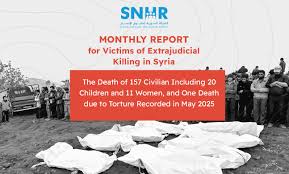The Syrian Network for Human Rights (SNHR) has reported the killing of 157 civilians in Syria during May 2025, including 20 children, 11 women, and one individual who died under torture, in its latest monthly report released today.
Despite the fall of the Assad regime in December 2024, the 23-page report reveals that patterns of violence persist across the country, with civilians continuing to bear the brunt of insecurity and lawlessness. SNHR based its findings on continuous monitoring, eyewitness accounts, image verification, and a wide network of local sources.
SNHR attributed the killings to various actors:
- 3 civilians, including a child, were killed by the Assad regime forces;
- 3 civilians by the interim government’s forces;
- 3 civilians by the Syrian Democratic Forces (SDF);
- 4 civilians by Israeli forces;
- 144 civilians, including 19 children and 11 women, by unidentified actors.
The report also recorded the deaths of a media worker and three civil defense personnel, the latter killed by landmine explosions. It documented two massacres—one involving armed gunmen and another resulting from an unidentified bombing.
SNHR highlighted that Aleppo, Lattakia, and Homs each accounted for approximately 15% of the monthly death toll, followed by Hama with 12%, most deaths caused by unidentified perpetrators.
In addition to civilian fatalities, the report noted eight attacks on vital civilian infrastructure, including health and rescue facilities. Three attacks were reportedly carried out by SDF forces, while others remain unattributed. The organization also documented the discovery of four bodies from a single family, believed to have been killed in earlier stages of the conflict and buried in suspected mass graves or abandoned sites.
Ongoing Instability After Assad
SNHR concluded that despite regime change, Syria remains unsafe for civilians. The country continues to witness deaths caused by remnants of war—such as cluster munitions and mines—as well as delayed injuries from previous attacks. The group emphasized that the transitional phase has not yet delivered meaningful improvements in public safety or governance.
Key Findings
SNHR found that:
- Indiscriminate violence, especially from landmines, continues to endanger lives.
- SDF attacks involving drones and artillery violate international humanitarian law.
- Remote bombings in residential areas point to a deliberate intent to harm civilians.
- Turkish military strikes failed to respect the principle of proportionality.
- Armed groups, including the SDF, continue to station forces in civilian zones, exposing populations to further risk.
- Deaths related to forced migration, arms misuse, and social breakdown highlight the need for post-conflict stability mechanisms.
Policy Recommendations
SNHR recommended a series of urgent steps to mitigate further civilian harm and strengthen transitional justice:
To the Syrian Transitional Government:
- Cooperate with UN mechanisms (including COI and IIIM) and international NGOs to investigate past crimes.
- Protect suspected mass grave sites and detention centers.
- Ratify the Rome Statute and grant the International Criminal Court retroactive jurisdiction.
- Launch nationwide demining campaigns, particularly in conflict-affected zones.
- Establish inclusive governance that guarantees civilian rights and service access.
To the UN Security Council and international community:
- Refer Syria to the ICC or establish a special tribunal for war crimes.
- Freeze assets of Assad-era officials and repurpose them for justice initiatives and humanitarian aid.
- Increase humanitarian support, especially in northeastern Syria.
- Ensure that aid distribution aligns with human rights benchmarks and enables conditions for safe, voluntary refugee returns.
To UN human rights bodies and international investigators:
- Intensify documentation and reporting of violations.
- Identify individual perpetrators and expose them internationally to prevent political or economic rehabilitation.
To the SDF, Turkish forces, and Syrian opposition factions:
- Open internal investigations into violations.
- Provide detailed maps of landmine locations to protect civilians.
- Cease positioning forces in civilian areas.
To humanitarian organizations:
- Prioritize the removal of unexploded ordnance alongside relief work.
- Establish secure shelter options for displaced women, children, and vulnerable groups.
- Provide clearly marked emergency vehicles to health and education centers.
SNHR concluded that the persistence of civilian deaths, even in the post-Assad phase, underscores the fragility of Syria’s transition and the urgent need for coordinated justice, security, and humanitarian interventions.


